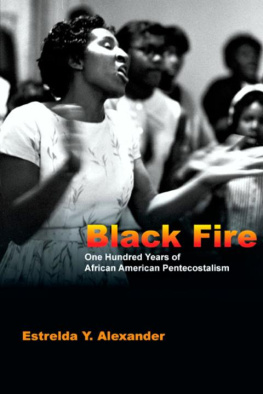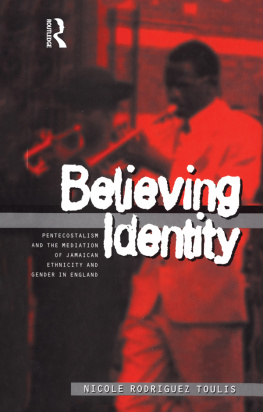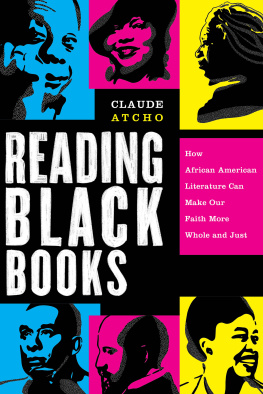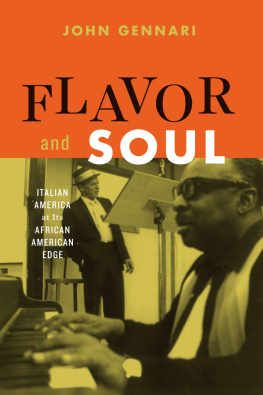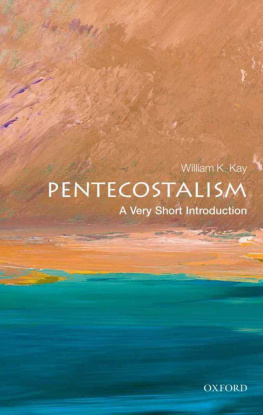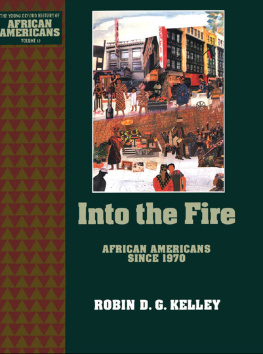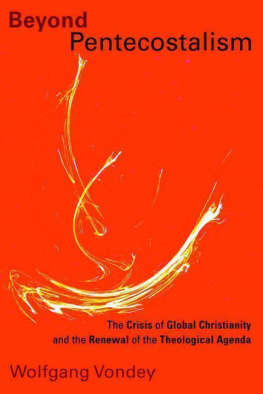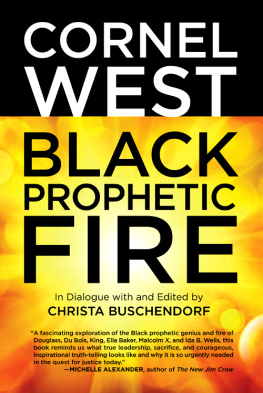Estrelda Y. Alexander - Black Fire: One Hundred Years of African American Pentecostalism
Here you can read online Estrelda Y. Alexander - Black Fire: One Hundred Years of African American Pentecostalism full text of the book (entire story) in english for free. Download pdf and epub, get meaning, cover and reviews about this ebook. year: 2011, genre: Religion. Description of the work, (preface) as well as reviews are available. Best literature library LitArk.com created for fans of good reading and offers a wide selection of genres:
Romance novel
Science fiction
Adventure
Detective
Science
History
Home and family
Prose
Art
Politics
Computer
Non-fiction
Religion
Business
Children
Humor
Choose a favorite category and find really read worthwhile books. Enjoy immersion in the world of imagination, feel the emotions of the characters or learn something new for yourself, make an fascinating discovery.
- Book:Black Fire: One Hundred Years of African American Pentecostalism
- Author:
- Genre:
- Year:2011
- Rating:4 / 5
- Favourites:Add to favourites
- Your mark:
- 80
- 1
- 2
- 3
- 4
- 5
Black Fire: One Hundred Years of African American Pentecostalism: summary, description and annotation
We offer to read an annotation, description, summary or preface (depends on what the author of the book "Black Fire: One Hundred Years of African American Pentecostalism" wrote himself). If you haven't found the necessary information about the book — write in the comments, we will try to find it.
Black Fire: One Hundred Years of African American Pentecostalism — read online for free the complete book (whole text) full work
Below is the text of the book, divided by pages. System saving the place of the last page read, allows you to conveniently read the book "Black Fire: One Hundred Years of African American Pentecostalism" online for free, without having to search again every time where you left off. Put a bookmark, and you can go to the page where you finished reading at any time.
Font size:
Interval:
Bookmark:

One Hundred Years of African American Pentecostalism
Estrelda Y. Alexander

............... 11
............. 15
2 "Every Time I Feel the Spirit"
3 Saved and Sanctified
4 The Color Line Was Washed Away in the Blood
5 What Hath God Wrought
6 God and Christ Are One
7 Singing the Lord's Song in a Strange Land
8 If It Wasn't for the Women
9 I Will Do a New Thing
10 Conclusion
........ 396
........ 398
.............. 402
.............. 404
....... 405
Black Fire: One Hundred Years of African American Pentecostalism is a treasure trove of scholarly insight and information on African American Pentecostalism. Being among the rare books able to craft a narrative chronicling and interpreting the century-long history of African American Pentecostalism, this book expands our knowledge of the diverse social and theological trajectories that constitute the tradition. Here, Estrelda Alexander introduces scholars and general readers to the triumphs and travesties of the African American Pentecostal phenomenon.
This work fits squarely within the school of scholarship plotted out by Walter Hollenweger, Leonard Lovett and others who emphasize the African roots of Pentecostalism, in general, and of African American Pentecostalism, in particular-while challenging interpretations that focus solely on white origins. Alexander here argues that roots of the movement-not just for African Americans but for white Pentecostals as welllie within a robust African spirituality with its beliefs in a supreme being, in the sacredness of creation, in the supernatural, in rituals of life and in ancestor veneration. She locates the embodiment of that African spirituality in the United States within the African survivals found in slave religion or "slave Christianity" of the antebellum era that stressed trances, visions, Spirit possession and the holy dance, as well as their conversion rituals, music making, oral tradition, and the theme of enslaved Africans being the children of God. Yet she nuances the African-roots thesis by stressing the role of the nineteenth-century black Holiness movement and the input of black Holiness leaders, such as William Christian and Charles Price Jones, to the theological roots of African American Pentecostalism, following a position argued by scholars such as William C. Turner, Cheryl Sanders and myself.
This work dives squarely into the debate over the founding of American Pentecostalism by advocating for the crucial role played by William J. Seymour, an African American, and the Azusa Street Revival, over which he presided. Refusing to dismiss the contributions of Charles Parham, a white American, she credits him in formulating the doctrine of initial evidence as central to the baptism of the Holy Spirit message Seymour originally preached. Rather than casting Parham as the founder, however, Alexander identifies him as a major catalyst in initiating what came to be known as the identifying mark of modern Pentecostalism-evidentiary tongues. Following Robert Mapes Anderson in distinguishing between Parham's "relatively small, localized movement" and Seymour's much larger, international movement, she places Parham at the front of the chronology of the movement but reserves identification of the role of founder for Seymour.
A major contribution of this work is that it confronts the topic of race unabashedly and interrogates the racial divide in American Pentecostalism, noting how white racism affected the formation and ongoing development of African American Pentecostalism. At various intervals throughout Black Fire, Alexander interrogates the polities and theologies of white Christianity that promote the racial oppression of African Americansfirst as enslaved people and later as second-class citizens during the segregation era. She further examines evidence of racist attitudes of white Pentecostals, such as: Parham, who attempted to undermine Seymour's leadership at Azusa Street and in the broader movement; the segregating of African Americans within predominately white denominations such as the Fire Baptized Holiness Church; and the struggle of African Americans who belong to predominately white Pentecostal denominations, such as the Church of God (Cleveland, Tenn.), to overcome paternalism and racial exclusion within denominational ranks.
Additionally, Alexander explores the history of two failed experiments in interracialism: the Church of God in Christ under Charles Harrison Mason's leadership and the Pentecostal Assemblies of the World under the leadership of Garfield T. Hayward. Central to her discussion of race in American Pentecostalism is an acknowledgment of the theological writ ings of Seymour, Charles Harrison Mason, Robert Clarence Lawson, Ida Robinson and others who unabashedly critiqued racism in the United States while often attempting to maintain an openness to their white Christian brothers, which was rarely returned.
Gender is another prominent theme in this volume. Alexander takes great pains to inform the reader of the pivotal role women played from the earliest formation through the ongoing development of the movement. She begins by exploring the ministries of black, Holiness, women evangelists and goes on to examine the role of several black women, such as Lucy Farrow and Jenny Moore Seymour of the Azusa Street Revival. She highlights organizational innovations, such as the women-headed denominations produced by Bishops Mary Magdalena Tate and Ida Robinson, as well the denominational women's departments erected by leaders such as Lizzie Robinson and Lillian Brooks Coffey. The pastoral ministries of women are reviewed, especially the ministries of Carrie Gutty of Baltimore, Lucy Smith of Chicago, Rosa Horn of New York City and Elizabeth Dabney of Philadelphia. The reality of sexism, which remains intact today within the ranks of African American Pentecostalism, is woven throughout her discussion of gender.
In Black Fire, Alexander blends historical reconstruction with theological interpretation. In this endeavor, her discussion of Seymour's theological reformulation of Parham's initial evidence and theology of the Holy Spirit as more than glossolalia and Spirit baptism is crucial. She also analyzes the theological distinctions between so-called trinitarian and oneness Pentecostalism, paying careful attention to describe those doctrines of oneness Pentecostalism-such as regenerational baptism and theology of the Godhead-with the respect that allows the latter movement, which is considered by many as heretical, to have a full hearing.
Alexander concludes Black Fire with a discussion of the involvement of African Americans in various aspects of charismatic Christianity, including the Word of Faith theology, the megachurch phenomenon and black neo-Pentecostalism within mainline congregations. Within this discussion she highlights the contributions of leaders such as Frederick Price of Crenshaw Christian Center in Los Angeles, John Bryant of the African Methodist Episcopal Church, George A. Stallings of the Roman Catholic Church, Carlton Pearson and T. D. Jakes. What is most signifi cant about this discussion is the degree of variety the leaders and their ministries exhibit in helping to shape the contours of the Pentecostal, charismatic, neo-Pentecostal continuum during the late twentieth and early twenty-first centuries.
Font size:
Interval:
Bookmark:
Similar books «Black Fire: One Hundred Years of African American Pentecostalism»
Look at similar books to Black Fire: One Hundred Years of African American Pentecostalism. We have selected literature similar in name and meaning in the hope of providing readers with more options to find new, interesting, not yet read works.
Discussion, reviews of the book Black Fire: One Hundred Years of African American Pentecostalism and just readers' own opinions. Leave your comments, write what you think about the work, its meaning or the main characters. Specify what exactly you liked and what you didn't like, and why you think so.

